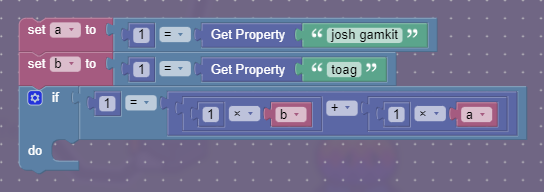This is a system for finding which button was pressed. Each button is wired to a trigger on the top and right, making coordinates.
How about I mess with variables to see if I can break the property limit…
Well, it seems as though variables are properties stored in blocks. Variables do not carry over, but they are perfect for storing a property in a single device. Also, if you want to make reversible changes to the value of a property, variables are perfect for that. Variables can also be set to text.
Here, have something confusing block code

This will activate only if ONE of the properties (josh gamkit, toag) equals 1.
So say we use the same block twice. Does the variable carry over?
No, if I understand what you mean, it does not carry over.
Lol, all those buttons and wires and such is a nightmare.
Wait, how does the setting of the variable work? How can you set something to a logic block?
A logic block returns either true or false. I think that true is 1, and false is 0, but @Blackhole927 might correct me on that.
Oh, so if they equal one, then it will be true. Otherwise false. So wouldn’t you check for true/false? I don’t think that is how the numbers would work.
Well, Black Hole just wanted to be complicated.
I swear i’m not overcomplicating things.
So setting a varible to an equal block will set it to a true or false value.
Now, keep in mind that gimkit is based in javascript. Javascript has this weird thing where you can add different data types, so for example true + 'lol" = “truelol”. We can abuse this.
(1 * a)
The above code will result in a 1 if a is true, and a 0 if not. So,
(1 * a) + (1 * b) == 1
The above code will therefore check if only ONE of the a or b properties is true.
This seems overcomplicated, but I understand it. I don’t think that we will use it, unless we convert the number to a stri- WAIT CAN WE ADD STRINGS?
Maybe
Yeah, just put them in a varible
Can we subtract strings then?
No, JS doesn’t support that.
Ok, this makes more sense now, thanks!
Checkers still can’t compare numbers to properties though, or properties to properties, right?
Not properties to properties, but you can do numbers to properties.